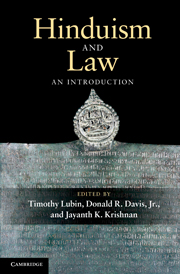Book contents
- Frontmatter
- Contents
- List of contributors
- Acknowledgements
- Chronology
- Abbreviations
- Map South Asia: political divisions c. 1860 and today
- Introduction
- Part I Hindu law
- Chapter 1 A historical overview of Hindu law
- Chapter 2 Dharmaśāstra
- Chapter 3 The practice of classical Hindu law
- Chapter 4 The creation of Anglo-Hindu law
- Chapter 5 Marriage and family in colonial Hindu law
- Chapter 6 Hindu law as personal law
- Part II Law in ancient and medieval Hindu traditions
- Part III Law and modern Hinduism
- Glossary
- Bibliography
- Index
Chapter 6 - Hindu law as personal law
state and identity in the Hindu Code Bills debates, 1952–1956
Published online by Cambridge University Press: 05 June 2012
- Frontmatter
- Contents
- List of contributors
- Acknowledgements
- Chronology
- Abbreviations
- Map South Asia: political divisions c. 1860 and today
- Introduction
- Part I Hindu law
- Chapter 1 A historical overview of Hindu law
- Chapter 2 Dharmaśāstra
- Chapter 3 The practice of classical Hindu law
- Chapter 4 The creation of Anglo-Hindu law
- Chapter 5 Marriage and family in colonial Hindu law
- Chapter 6 Hindu law as personal law
- Part II Law in ancient and medieval Hindu traditions
- Part III Law and modern Hinduism
- Glossary
- Bibliography
- Index
Summary
Introduction
As India negotiated the transition from the colonial era to Independence, issues of religion and law came to the forefront of the political agenda. One of the first major legislative accomplishments of India’s newly elected Parliament was the passage of the Hindu Code Bills (HCB) between 1952 and 1956. This series of four bills sought to codify and reform Hindu personal law – a project begun but ultimately abandoned by the British colonial government. A source of significant social and political controversy, this legislation outlined and prefigured the shape that Hindu law as personal law would take in independent India. The politicization of the personal laws reached its apogee in the years after Independence, as Hindu personal law came to be entangled in issues of community, identity, and politics. Two key transformations begun in the colonial era came to fruition in this critical period: Gender became the site on which modern Hindu law (as personal law) has been constructed; and the modern state became the institution through which modern Hindu law (as personal law) must be negotiated. Examining the debates over, and surrounding, these bills – both within and outside the institutions of government – demonstrates these key transitions in Hindu personal law post Independence.
These two processes worked ultimately to disengage the legal category of “Hindu law” from its traditional roots in Dharmaśāstra: Rather than religious texts being the guiding force in defining Hindu law, Hindu personal law came to be embedded instead in the discourses and contradictions of modern identity and state power. The first site of transformation was gender: Religious and national identities were constructed in gendered terms during the debates. Secular nationalists supported the bills as a way to achieve national unity and progress by enhancing and modernizing Hindu women’s legal rights and social status. Religiously oriented opponents of the bills sought to preserve a socioreligious conception of Hindu social customs and traditions by immobilizing any perceived change to them, and thus to women’s legal and other rights and status.
- Type
- Chapter
- Information
- Hinduism and LawAn Introduction, pp. 105 - 120Publisher: Cambridge University PressPrint publication year: 2010
- 2
- Cited by



